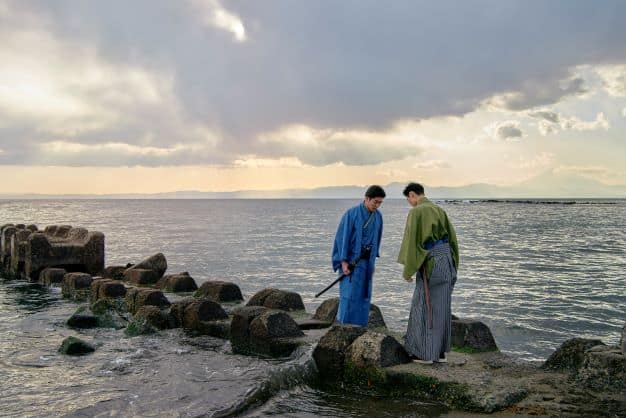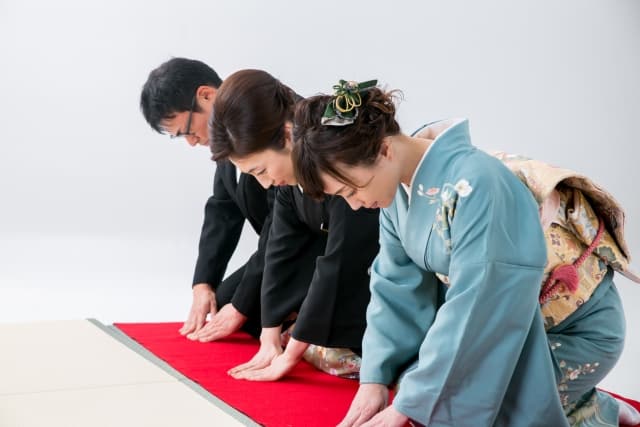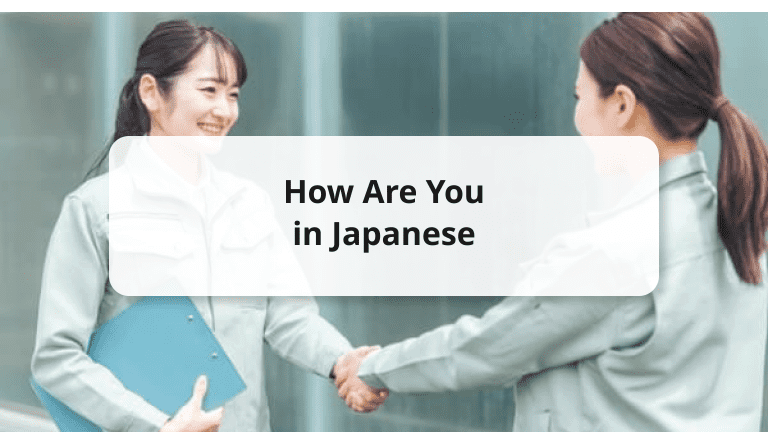Do you want to know what expressions Japanese people use to say “How are you?” on a daily basis? This is the place to learn the true Japanese language and culture. If you haven’t learned how to say thank you in Japanese yet, you may want to check that out as well!
This chapter will teach you the different types of “How are you?” in Japanese, as well as what they are commonly used for and when they are used.
Table of Contents
How Are You in Japanese: Formal
| Formal | Pronunciation | Meaning |
|---|---|---|
| お元気ですか? | ogenki desuka | How are you? |
| お変わりありませんか? | okawari arimasenka | Is everything going well? |
| 最近どうですか? | saikin dou desuka | How have you been lately? |
| いかがお過ごしですか? | ikaga osugoshi desuka | How have you been lately? |
| 調子はどうですか? | choushi wa dou desuka | How is it going? |
| お世話になっております | osewa ni natte orimasu | Thank you for your support. |
| ご無沙汰しております | gobusata shite orimasu | I haven’t seen you for a while. |
お元気ですか?(ogenki desuka)- How are you?
“お元気ですか (ogenki desuka)” means “how are you” in Japanese. Many people might have heard of it, and it must be known widely as well. 元気(genki)referes to “lively” in English. It is a phrase that can be used in a variety of situations, not only in letters and e-mails but also for people you have not seen in a while. However, “お元気ですか (ogenki desuka)” is not a common question in Japanese culture. Instead, most Japanese people frequently use hello a lot.
お変わりありませんか?(okawari arimasenka)- Is everything going well?
The phrase “お変わりありませんか(okawari arimasenka)” is an expression used to concern about the condition of a person whom one hasn’t seen for a long time. You can ask about changes that include not only the state of health, but also work, family, hobbies, and private life.
最近どうですか?(saikin dou desuka)- How have you been lately?
This translates to “How have you been lately?” For example, if you’re going to see someone who is older than you, such as your boss, a teacher, and you want to ask how he or she has been lately, then this is the phrase to use!
いかがお過ごしですか?(ikaga osugoshi desuka)- How have you been lately?
If you often communicate with Japanese people via e-mail, you have probably seen this phrase before. This phrase is often used while exchanging e-mails, and you can use it to show your concern for the safety of one’s safety.
調子はどうですか?(choushi wa dou desuka)- How is it going?
This phrase may appear to you as a greeting. However, it is commonly used in Japan to indicate concern for someone who has a cold or illness. Unlike “お元気ですか (ogenki desuka)”, “調子はどうですか(choushi wa doudesuka)“should not be used to address someone who is not feeling well because it does not conveyconcern.
お世話になっております(osewa ni natte orimasu)
This term is frequently used to address business partners and customers to whom Japanese people are indebted on a daily basis. “お世話(osewa)” refers to “to mediate” in English and it is very common way to express your gratitude to someone. BUT, be careful not to use it with someone you have never met before because it may bring discomfort.
ご無沙汰しております(gobusata shiteorimasu)- I haven’t seen you for a while.
This is often used as a greeting to someone you have not seen for a long time in formal situations, such as the opening greeting of a letter or e-mail, or with relatives whom you have not seen in a long time at New Year’s, Obon, weddings, funerals, etc. And, it should be used when you have not seen the person for more than three months.

How Are You in Japanese: Informal
| Informal | Pronunciation | Meaning |
|---|---|---|
| 元気? | genki | How are you? |
| 元気にしてた? | genki ni shiteta | What are you up to lately? |
| 変わりない? | kawari nai | Is everything going well? |
| 最近どう? | saikin dou | How have you been? |
| 最近何してた? | saikin nani shiteta | What did you do recently? |
| 調子はどう? | saikin choushi wa dou | How is it going? |
| 久しぶり | hisashiburi | It’s been a while. |
| 久々 | hisabisa | Long time no see. |
| お疲れ様 | otsukare sama | To show your gratitude towards your colleagues |
元気?(genki) – How are you?
元気(genki)is an informal way of saying “お元気ですか(o genki desu ka)” and is often used among friends and close associates. It is also easy to memorize as it’s very short compared to “元気ですか(genki desu ka)”. It’s also common to say good morning instead of saying “元気(genki)” Japanese people do not necessarily ask “How are you” in Japanese culture.
元気にしてた?(genki ni shiteta)- What are you up to lately?
It is the same meaning of both “元気ですか (genki desu ka)” and “元気(genki)” in Japanese. However, Japanese people often use it with close friends. Therefore, you shouldn’t use it to your superiors.
変わりない?(kawari nai)- Is everything going well?
It is an informal way of “お変わりありませんか(o kawari arimasen ka)”; it is a commonly used phrase among close friends or family. Of course, you can’t use it to people who you met for the first time.
最近どう?(saikin dou)- How have you been?
This phrase is the informal version of “最近どうですか(saikin dou desu ka)”. Suppose, you’re going to catch up with your friend and ask what he/she has been, and you can say 最近どう ”(saikin dou)”.
最近何してた?(saikin nani shiteta)- What did you do recently?
最近何してた(saikin nani shite ta)is a common phrase among Japanese people and is used when you want to ask about anything, whether it is about work, a hobby, or what the person is hooked on.
調子はどう?(saikin choushi wa dou)- How is it going?
Unlike the other phrases, “最近調子はどう(saikin choushi wa dou)” is a phrase that can be used widely to refer not only to people but also to things. For instance, if you want to say “How’s your work going?” in Japanese, it’s “仕事の調子はどう”.
久しぶり(hisashiburi)- It’s been a while.
As you can see that this expression sounds quite different from “How are you”. However many Japanese people tend to use this phrase when they haven’t seen each other for a while instead of using “元気(genki)” The following is a list of long time no see expressions in order from most casual to most formal: 久しぶり(hisashiburi)> お久しぶりです(o hisashiburi)> ご無沙汰しております(go busata shite o rimasu)
久々(hisabisa)- Long time no see.
久々(hisabisa)has the same meaning as 久しぶり(hisashiburi), and you hear a lot in Japan. What are the differences between “久しぶり(hisashiburi)” and “久々(hisabisa)”?
Well, “久しぶり(hisashiburi)refers to have the same thing happen again after a long time has passed. On the other hand, “久々(hisabisa)”emphasizes the meaning that a longer time has passed since the last time it was there. And, to have the same thing happen again after a long time has passed.
お疲れ様(otsukare sama)
What is お疲れ様(otsukare sama)? Unfortunately, there’s no expression of this in English. In fact, Japanese people use it colleagues or managers when clocking out. Or, you can also say to your friends when going to eat with them after work meaning “thank you for your hard work!”

How to Respond to How Are You in Japanese? (Formal/Informal)
| Formal | Informal | Meaning |
|---|---|---|
| 元気です(genki desu) | うん(un) | I’m fine. |
| おかげさまで元気にしております(okagesama de genki ni shite orimasu) | 元気だよ(genki dayo) | I’m doing great. |
| 調子が悪いです(choushi ga warui desu) | 調子悪い(choushi warui) | I don’t feel good. |
| あまりです(amari desu) | あんまり(anmari) | Not really. |
| 普通です(futsuu desu) | 普通(futsuu) | Not bad. |
| 特に変わりはありません(tokuni kawari wa arimasen) | 特に変わらないよ(tokuni kawaranaiyo) | Nothing special. |
元気です(genki desu)/ うん(un)- I’m fine.
Some Japanese people appear to believe that answering anything other than “genki” will give the other person in trouble. As a result, they frequently use this expression even when they are not “genki.”
元気です。〇〇さんは?- I’m fine. How about you?
genki desu. 〇〇san wa?
おかげさまで元気にしております(okagesama de genki ni shite orimasu)/ 元気だよ(genki dayo)- I’m doing great.
You can say these words when you’re asked “元気?”, “お変わりありませんか?”, “最近どう?”or “調子はどう?”.
おかげさまで元気にしておりました。- I’m doing great.
okagesama de genki ni shite orimasita
調子が悪いです(choushi ga warui desu)/ 調子悪い(choushi warui)- I don’t feel good.
You can use these expressions when someone inquires about your health/work situation. Consider the following example.
今日は体の調子が悪いです。- I’m not feeling well today.
kyou wa karada no chousi ga warui desu.
あまりです(amari desu)/ あんまり(anmari)- Not really.
Both “あまりです” and “あんまり” have the same meaning in Japanese, which is “not really / not very well.”
昨日は体調があまり良くなかったです。- I wasn’t feeling well yesterday.
kinou wa taichou ga amari yokunakatta desu.
普通です(futsuu desu) / 普通(futsuu)- Not bad.
Many Japanese individuals use these phrases because they are unsure how to react to “how are you?”
普通だよ~ – Not so bad.
futsuu dayo.
特に変わりはありません(tokuni kawari wa arimasen)/ 特に何も変わらないよ(tokuni nanimo kawaranaiyo)- Nothing special.
The phrases above means “no special change or modification.” For example, the sentence, “特に変わりはありません” contains the meaning of “There’s nothing in particular”.
最近は、特に何も変わらないよ。- Nothing in particular these days.
saikin wa tokuni nanimo kawaranaiyo.
How Do Japanese People Greet Each Other?
In general, we imagine “occasions to greet” as the timing of meeting and parting wherever in the world. It’s only that, in comparison to other countries, Japanese greetings contain a strong element of “politeness” and “gratitude.” A “bow” is a common form of Japanese greeting. Here, you will learn about the different types of bowing that are regularly employed in Japan.

立礼(ritsurei): The image above depicts the most common way for Japanese people to bow, in which the body is lightly tilted at a 15-degree angle. It is also used in conjunction with greeting words (such as Konnichiwa) between people who are relatively close to each other, such as colleagues or relatives.

座礼(zarei): The image above is also one of the most common greetings in Japan. When you want to show respect, take 1 second from the zarei position to tilt your body 30 degrees, slip your hands in front of your knees and hold still for 1 second, then slowly look up for 2 seconds.
FAQs
1. 元気?(genki)
2. お変わりありませんか?(okawari arimasen ka)
3. 最近どう?(saikin dou)
4. お世話になっております (osewa ni natte orimasu)
5. お疲れ様(otsukare sama)
1. 元気です(genki desu)
2. おかげさまで元気にしております(okagesama de genki ni shite orimasu)
3. あんまり(anmari)
4. 普通です(futsuu desu)
5. うん(un)
元気(genki)referes to “lively” ,“energetic” and “healthy” in English.
Let’s take a crack at applying the phrases you learned here!

I hope you now have a better understanding of “How are you?” expressions in Japanese that can be used in both business and everyday situations.
You can use what you’ve learned about how to respond to “How are you?” phrases in Japanese the next time you meet a Japanese speaker!
Moreover, if you haven’t learned the days of the week in Japanese or the time in Japanese, you might want to check those out as well, and you will be ahead of the game! Let’s study Japanese language and culture using AmazingTalker!
















